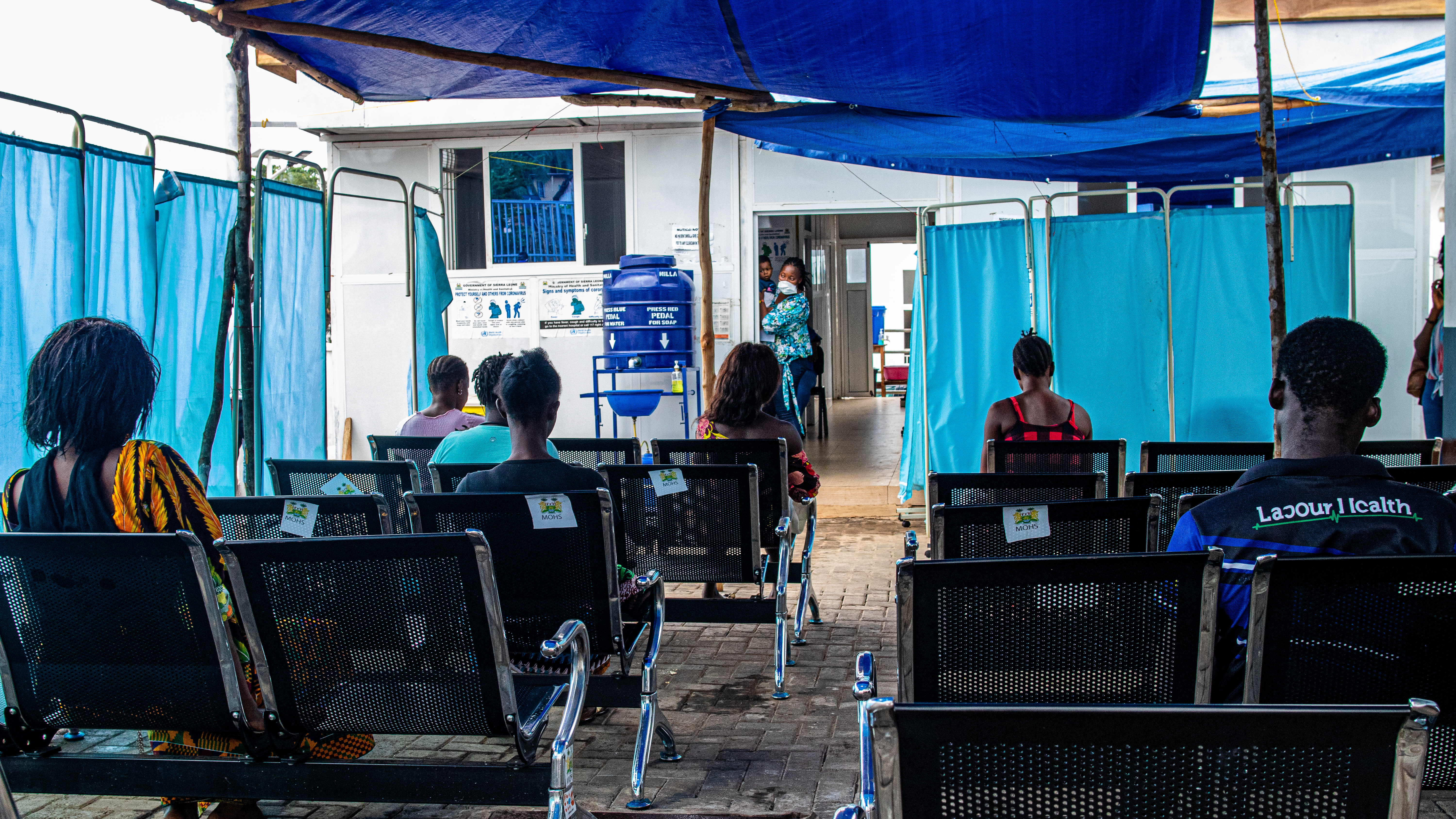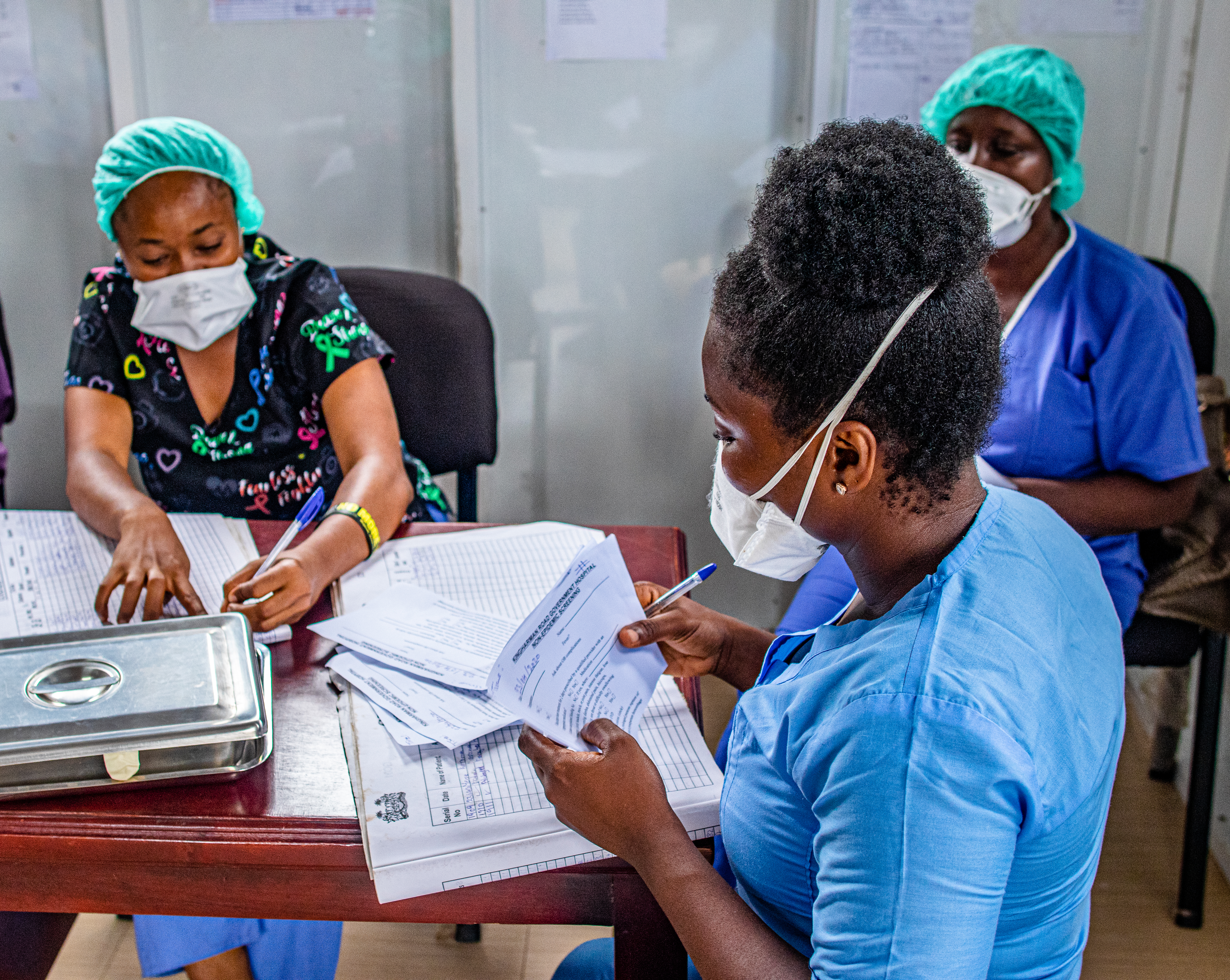In Sierra Leone, ICAP at Columbia University is supporting the improvement of infection prevention and control (IPC) practices across the health system, making important gains in addressing health care obstacles exacerbated by the COVID-19 pandemic.
ICAP partners with Resolve to Save Lives (RTSL), an initiative of the global public health organization Vital Strategies, to ensure that health care workers and facilities are equipped with the training and infrastructure needed to prevent and control infections.
While Sierra Leone was an early adopter of COVID-19 quarantine and social distancing measures, which safeguarded early infections, limited health facility procedures were in place to execute IPC strategies as well as mobilize trained health care professionals needed to carry them out.
Since May 2021, the ICAP and RTSL project has supported 450 health facilities through mentoring and supportive supervision, including introduction of dedicated outdoor screening and triage centers to 297 of the 450 targeted health facilities. The project implemented functional hand hygiene stations at screening and triage areas at 132 of the health facilities that didn’t previously have them.

Additionally, 2,932 health care workers at the 450 health facilities were trained on standard IPC precautions – such as waste management practices, appropriate use of face shields and masks, and optimal cleaning practices – resulting in a 36 percent increase in health facilities with a dedicated IPC professional and 62 percent increase in health facilities with dedicated personnel trained on screening and triage. Training of such individuals has significantly improved patient screening processes for COVID-19 and other infectious disease symptoms at health facility entry points, helped establish IPC standard operating procedures (SOPs), and increased the use of more efficient IPC tools, such as no-touch thermometers.
“IPC challenges in Sierra Leone included knowledge gaps, limited supplies, and lack of motivation among health workers, all of which the project has addressed,” said Senesie Margao, public health officer at the National IPC Unit of the Ministry of Health. “With the help of ICAP/RTSL project, we now have well-trained IPC focal personnel and standard structures across each facility.”
In addition to improved COVID-19 measures, the project helped sustain continuity, and even improved delivery, of other essential services as well. For example, between January 2020 and 2022, there was a 59 percent increase in people living with HIV who started taking anti-retroviral therapy (ART) medication, a 32 percent increase in tuberculosis cases diagnosed, and a 26 percent increase of pregnant women tested for HIV.
“Taking a closer look at improving IPC has resulted in improved practices across health facilities generally, demonstrating that IPC is a fundamental pillar to achieve quality healthcare delivery,” said Baindu Saidu, a certified midwife and IPC focal person at Gegbwema Community Health Center in Kenema, Sierra Leone.

To help facilitate vaccination and reduce health care-associated infections, the project also supported the assessment of COVID-19 vaccination coverage among health care workers within the 450 project-supported health facilities. Of the 9,399 health care workers reached during the assessment, 91.3 percent were fully vaccinated against COVID-19 compared to the 56.6 percent national COVID-19 vaccination coverage among health care workers.
“This very impressive vaccination rate among health care workers in the 450 ICAP-supported health facilities could probably be explained by improved knowledge among healthcare workers on COVID-19 prevention and the role of the vaccine,” said Dr. Tom Sesay, former manager of the National Expanded Program on Immunization.
Given the project’s success in strengthening IPC among the targeted health facilities, ICAP and RTSL are now working with the government of Sierra Leone and its partners to develop and implement sustainability strategies for IPC implementation in the 450 facilities and beyond by advocating for improved government funding for such activities.
“Now that we have addressed some of the IPC challenges health facilities face, ICAP looks forward to continuing to provide technical assistance to strengthen compliance to IPC standards across the health system levels,” said Amon Njenga, team lead of ICAP’s Capacity Building & Special Projects program. “This progress is significant for Sierra Leone because the health systems in the 450 primary health facilities have been strengthened to prevent, detect, and respond to healthcare-associated infections.”
About ICAP
A major global health organization that has been improving public health in countries around the world for nearly two decades, ICAP works to transform the health of populations through innovation, science, and global collaboration. Based at Columbia Mailman School of Public Health, ICAP has projects in more than 30 countries, working side-by-side with ministries of health and local governmental, non-governmental, academic, and community partners to confront some of the world’s greatest health challenges. Through evidence-informed programs, meaningful research, tailored technical assistance, effective training and education programs, and rigorous surveillance to measure and evaluate the impact of public health interventions, ICAP aims to realize a global vision of healthy people, empowered communities, and thriving societies. Online at icap.columbia.edu








